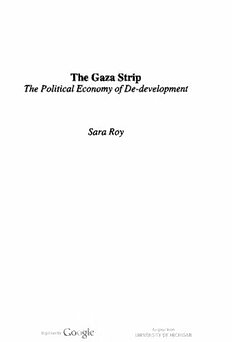
The Gaza Strip: The Political Economy of De-development PDF
Preview The Gaza Strip: The Political Economy of De-development
The Gaza Strip The Political Economy of De-development Sara Roy Got) Original from Digitized by UNIVERSITY OF MICHIGAN The Gaza Strip The Political Economy of De-development Sara Roy Institute for Palestine Studies Washington, DC 1_ Original from Digitized by LjO O glt UNIVERSITY OF MICHIGAN The Institute for Palestine Studies, founded in Beirut in 1963, is an independent nonprofit Arab research and publication center, not affiliated with any political organization of government. The opinions expressed in its publications do not necessarily reflect those of the Institute. © 1995 by the Institute for Palestine Studies All rights reserved. I.B. Tauris & Co., Ltd., London, is the exclusive distributor of IPS publications outside of North America. Library of Congress Cataloging-in-Publkation Data Roy, Sara M. The Gaza Strip : the political economy of de-development / Sara Roy. p. cm. Includes bibliographical references (p. ) and index. ISBN 0-88728-260-1. - ISBN 0-88728-261-X (pbk.) 1. Gaza Strip-Economic conditions. 2. Gaza Strip-Economic policy. 3. Israel-Economic policy. 4. Palestinian Arabs-Govemment policy.—Israel. I. Title. HC415.25.Z7G397 1995 330.953 l-dc20 95-12112 Printed in the United States of America Original from Digitized by UNIVERSITY OF MICHIGAN To the camp people Got) Original from Digitized by UNIVERSITY OF MICHIGAN 1-^ Original from Digitized by ^ ,O t)g lC UNIVERSITY OF MICHIGAN Our territory is inhabited by a number of races speaking different languages and living on different historic levels___A variety of epochs live side by side in the same areas or a very few miles apart, ignoring or devouring one another.... Past epochs never vanish completely, and blood still drips from all their wounds, even the most ancient. Octavio Paz Labyrinth of Solitude The Jewish state cannot exist without a special ideological content. We cannot exist for long like any other state whose main interest is to insure the welfare of its citizens. Yitzhak Shamir New York Times 14 July 1992 There is no primitive. There are other men living other lives. Paul Rabinow Reflections on Fieldwork in Morocco Original from Digitized by UNIVERSITY OF MICHIGAN 1-^ Original from Digitized by ^ ,O t)g lC UNIVERSITY OF MICHIGAN Table of Contents Acknowledgments XI Preface xiii Part I: History Introduction: The Gaza Strip and the Question of Development 3 Chapter 1: The Gaza Strip Today: An Overview 13 Chapter 2: The Development of the Gaza Economy during 31 the British Mandate—The Peripheralization of the Arab Economy in Palestine Chapter 3: Gaza under Egyptian Military Administration 65 (1948— 1967)—Defining the Structure of the Gaza Strip Economy Chapter 4: The Gaza Strip under Israeli Military 103 Occupation (1967-1987)—A Political History Part II: Israeli Occupation and De-development Chapter 5: Theories of Development and Underdevelopment: 117 The Particularity of Palestinian Dependence Chapter 6: The Policy Roots of De-development 135 Chapter 7: Expropriation and Dispossession 161 Chapter 8: Integration and Extemalization 209 Chapter 9: Deinstitutionalization 263 Part III: Continued Economic Dislocations Chapter 10: The Intifada—Economic Consequences of a 291 Changing Political Order Chapter 11: The War in the Gulf and the March 1993 309 Closure—Gaza's Economic Dismemberment Part IV: The Face of the Future Conclusion: The Gaza-Jericho Agreement: 323 An End to De-development? Bibliography 335 Index 365 Maps 373 Google Original from Digitized by UNIVERSITY OF MICHIGAN 1-^ Original from Digitized by ^ ,O t)g lC UNIVERSITY OF MICHIGAN Acknowledgements I am indebted to literally hundreds of people, without whose assistance this book could not have been written. Many if not most of these individuals, both Palestinian and Israeli, risked a great deal to help me. The people of Gaza’s refugee camps, to whom this book is dedicated, deserve special mention. On occasions too numerous to count, they willingly endangered themselves and their families by allowing me to live with them and by escorting me surrepti tiously throughout the camps so that I could do my work. No one ever refused me, and no request was ever too great. I cannot name all or even most of them, for they fear retribution. But they know who they are, and I shall never forget what they did for me. I would like to thank the following people for the roles each played in the writing of this book: Alya Shawa; Talal Abu Rahme; Haidar and Huda Abd al- Shafi; Martha Myers; Meron Benvenisti; Henry Selz; Sharhabeel Alzaeem; Kassem Ali; Abu Abed; Mohammed Abu Shawish; Abu Mahmood; Itaf and her parents; Raba; Halima; Hatem and Aida Abu Ghazaleh; Oun Shawa; the late Assad Saftawi; Mohammed Najah; the men and women of the popular commit tees; Yassir, Fatma; Salah; Mohammed Zenadine; Abdel Latif Abu Middain; Salah El Ryashi; Mary Khass; Hisham Awartani; Salah Sakka; Hatim Abu Shaban; Samir Badri; Khaled and Salah Abd al-Shafi; Fawaz Abu Sitta; the “bad boys”; Ahmad Abdullah; Rhona Davies; Peter Johnson; Rick Larson; Douglas Ross; Michael Daum; Jake Walles; Agneta Bohman; Jorgen and Carmen Rosendal; Dean and Donna Fitzgerald; Leila Richards; Ulrike Krammer; Klaus XI Original from Digitized by UNIVERSITY OF MICHIGAN
